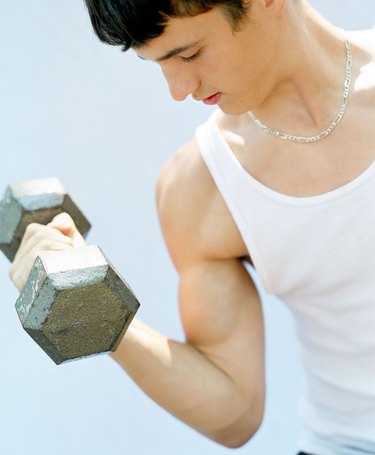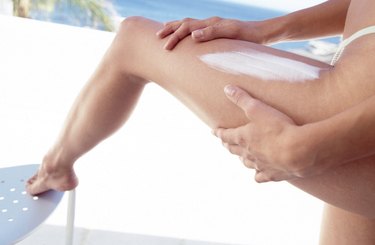
Cramps are painful muscle spasms that can occur after intense exercise or competition. Cramps are not usually dangerous, but can be extremely painful. Besides overuse, muscle cramps can stem from dehydration, diuretic medications or an imbalance of the minerals calcium, magnesium and potassium. There are two sets of muscles called biceps in the human body: biceps brachii in the arm and biceps femoris in the leg.
Biceps Muscles
Video of the Day

The biceps brachii muscle is a two-part muscle in your upper arm. When it tightens, it bends the elbow. One head of the biceps brachii connects to the front of your shoulder so it also helps move the arm across your chest. The biceps femoris is another two-part muscle, part of the hamstrings in the back of your thigh. It originates on the ischium -- your sitting bone -- and inserts below the outside of the knee. The biceps femoris bends your knee and also extends your leg backwards. Either set of biceps muscles can develop cramps.
Video of the Day
Massage
Post-event massage is a group of massage techniques used by massage therapists on athletes after intense competition or training. However, it isn't just for athletes. The same techniques can be used for any muscle cramp. Massage therapists use massage oil or cream and sliding/kneading techniques with light to moderate pressure. The sliding movements help lengthen the cramping muscle. Kneading helps to break up a spasm. Gentle compression also helps to break up the spasm. Press with medium pressure into the center of the cramp and hold the pressure for a minute. You can also do rhythmic compression, slowly pressing into the muscle and then releasing the pressure repeatedly.
Stretching
Stretching can help lengthen muscle fibers, working against the muscle spasm. You can stretch the muscle, either with long gliding massage strokes or by using stretching exercises. For biceps muscles in the arm or leg, straightening the limb stretches the muscle. You can indirectly stretch a cramped muscle by contracting the opposing muscle. For a biceps femoris cramp, tighten your quadriceps muscles and straighten your leg. For a biceps brachii cramp, tighten your triceps muscles and straighten your arm.
Other Tips
Drink fluids during and after intense exercise or competition to prevent dehydration. If you get a muscle cramp that won't let go, drink at least 8 oz. of water right away. If you have been sweating profusely, you may want to drink a sports drink or vegetable juice. If you have frequent muscle cramps, discuss it with your physician to rule out underlying more serious health conditions.
Is this an emergency? If you are experiencing serious medical symptoms, please see the National Library of Medicine’s list of signs you need emergency medical attention or call 911.